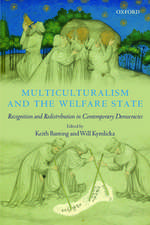The Political Roots of Racial Tracking in American Criminal Justice
Autor Nina M. Mooreen Limba Engleză Paperback – 25 ian 2015
| Toate formatele și edițiile | Preț | Express |
|---|---|---|
| Paperback (1) | 255.09 lei 3-5 săpt. | |
| Cambridge University Press – 25 ian 2015 | 255.09 lei 3-5 săpt. | |
| Hardback (1) | 575.69 lei 6-8 săpt. | |
| Cambridge University Press – 25 ian 2015 | 575.69 lei 6-8 săpt. |
Preț: 255.09 lei
Nou
Puncte Express: 383
Preț estimativ în valută:
48.81€ • 52.20$ • 40.70£
48.81€ • 52.20$ • 40.70£
Carte disponibilă
Livrare economică 27 martie-10 aprilie
Preluare comenzi: 021 569.72.76
Specificații
ISBN-13: 9781107654884
ISBN-10: 1107654882
Pagini: 406
Ilustrații: 68 b/w illus. 54 tables
Dimensiuni: 152 x 228 x 21 mm
Greutate: 0.54 kg
Editura: Cambridge University Press
Colecția Cambridge University Press
Locul publicării:New York, United States
ISBN-10: 1107654882
Pagini: 406
Ilustrații: 68 b/w illus. 54 tables
Dimensiuni: 152 x 228 x 21 mm
Greutate: 0.54 kg
Editura: Cambridge University Press
Colecția Cambridge University Press
Locul publicării:New York, United States
Cuprins
1. Racial tracking: two law-enforcement modes; 2. Policy process theory of racial tracking: an overview; 3. A color-blind problem: the US Supreme Court and racial influences in law enforcement; 4. Opportunities for change: the racial justice agenda in Congress; 5. Congress as power player: racial justice versus 'law and order'; 6. The politics principle and the party playbook; 7. Public mind-set: what Americans believe about race, crime, and criminal justice disparities; 8. Reasons to believe: options concerning race, crime, and justice.
Recenzii
'American criminal justice policies and practices systematically treat black people differently - worse than other people - and obstruct their full, equal and untrammeled participation in American life. The problems are neither unknown nor insoluble but go unacknowledged and unaddressed in mainstream American politics. Nina Moore compellingly explains how and why that has happened.' Michael Tonry, McKnight Presidential Professor in Criminal Law and Policy, University of Minnesota
'Imagine Richard Wright as an academic writing Native Son - full of statistics and theories - but at heart always returning to a murder. Author Nina Moore's childhood friend is the victim. Her adult work as a professor is figuring out what happened and why it is still happening.' Juan Williams, Fox News political analyst, author of Thurgood Marshall: American Revolutionary and Eyes on the Prize
'Moore offers a broad indictment of racism in criminal justice, reaching beyond the biases of police, prosecutors, and criminal-court judges. She shows how a pervasive tendency to blame blacks for the problems they face encourages legislative and public indifference to reforming a system that channels African Americans toward harsher punishment than whites. This detailed account argues that we must challenge punitive public attitudes and legislative shortsightedness, as well as actors within the criminal-justice system, if we are ever to arrive at a more even-handed approach.' Doris Marie Provine, Professor Emerita, School of Social Transformation, Arizona State University
'Imagine Richard Wright as an academic writing Native Son - full of statistics and theories - but at heart always returning to a murder. Author Nina Moore's childhood friend is the victim. Her adult work as a professor is figuring out what happened and why it is still happening.' Juan Williams, Fox News political analyst, author of Thurgood Marshall: American Revolutionary and Eyes on the Prize
'Moore offers a broad indictment of racism in criminal justice, reaching beyond the biases of police, prosecutors, and criminal-court judges. She shows how a pervasive tendency to blame blacks for the problems they face encourages legislative and public indifference to reforming a system that channels African Americans toward harsher punishment than whites. This detailed account argues that we must challenge punitive public attitudes and legislative shortsightedness, as well as actors within the criminal-justice system, if we are ever to arrive at a more even-handed approach.' Doris Marie Provine, Professor Emerita, School of Social Transformation, Arizona State University
Notă biografică
Descriere
This book examines the role of the public and policy makers in enabling the race problem in the American criminal justice system.
















